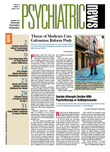Countless cancer patients have complained over the years about a curious, bothersome feeling in their heads during and after chemotherapy that's come to be known “chemo-brain.” The condition is characterized by fuzzy thinking, foggy memory, and an overall feeling of brain drain.
It appears that relief for chemo-brain may not, however, be far off, according to a new study by researchers at the University of Rochester Medical Center.
The drug showing promise in the fight against chemo-brain is modafinil (Provigil), which has been approved to treat narcolepsy. Scientists are not exactly certain how it works. What they know is that it's a unique type of stimulant that offers people a jolt of wakefulness and mental alertness when they desperately need it—lasting about 12 hours—with seemingly few negative side effects.
As reported in June at the annual meeting of the American Society of Clinical Oncology, 68 female subjects with a diagnosis of breast cancer participated in the eight-week clinical trial to test the effects of modafinil on treatment-related fatigue.
Subjects were enrolled in the trial following completion of their cancer chemotherapy regimen. All were prescribed a 200 mg, single-dose pill of modafinil once a day, the standard recommended dose for narcolepsy.
All the women took this dose for the first four weeks of the study. Then during the next four weeks, half the study group continued to take the drug, while half took a placebo. Standardized, controlled tests were given to the subjects before and after the trial to measure their memory and mental concentration.
The research team reported that the women who stayed on the modafinil regimen for the duration of the trial did report relief from fatigue. But the researchers didn't stop there as planned. They revisited the data to see if there had been any impact during the study on chemo-brain symptoms. Subsequently they found that the subjects had also experienced significant improvements in memory, concentration, and learning.
“We knew from previous studies that modafinil does alleviate problems with memory and attention, and were hoping it would do the same for breast-cancer patients experiencing chemo-brain, which it did,” said the study's lead author Sadhna Kohli, Ph.D, a research assistant professor at the University of Rochester's James P. Wilmot Cancer Center.
Why exactly does this stimulant work for chemo-brain, when some others, such as the amphetamine methylphenidate, have been reported ineffective?
Modafinil “is a different kind of stimulant,” said Kohli, who in a 2006 study found more than 80 percent of the almost 600 cancer patients surveyed struggled with chemo-brain symptoms for weeks during and months after chemotherapy.
“Modafinil is a memory improving and mood enhancing psychostimulant. .a novel wake-promoting agent that is effective and well tolerated in the treatment of excessive sleepiness associated with narcolepsy and also in persons with shift work sleep disorder.”
Modafinil, she continued, “is in a class of drugs called eugeroics (meaning 'good arousal'). The basis of its uniqueness lies in its ability to only 'stimulate' when stimulation is required. The precise mechanism(s) through which modafinil promotes wakefulness is unknown.”
According to the FDA, modafinil is a racemic compound that, like amphetamines and caffeine, “activates the central nervous system,” but that unlike amphetamines has a low abuse potential and has “minimal effects on the cardiovascular, respiratory, renal, or gastrointestinal systems.”
Despite its small size, the University of Rochester study has created a lot of buzz among chemo-brain researchers, cancer patients, and in the mainstream press.
“We have received a fair amount of media coverage nationwide,” said Kohli. “Along with cancer-treatment professionals being interested in the study, we have also received attention from patients who want to know how they can get modafinil for chemo-brain problems. Although larger studies are needed to confirm our findings, it is up to the patient's physician to decide whether the patient is an ideal candidate for off-label modafinil.”
She acknowledged that the study—jointly funded by Cephalon Inc., the maker of modafinil, and the National Cancer Institute—has been criticized for its post-study alteration in methodology.
“The study was designed to see the effect of modafinil on fatigue in breast-cancer patients and not [on] cognitive function,” Kohli said. This criticism, she said, is “legitimate, and future studies will be designed with cognitive function being the primary outcome.”
The results of the study have not yet been published.
Kohli said her research team recently has received funding from the Susan Komen Foundation to conduct a new study on cognitive function in women receiving breast-cancer chemotherapy.
According to Kohli, this new study will involve “testing [cancer] patients with both neuropsychological assessments and brain imaging using magnetic resonance spectroscopy to investigate what brain metabolites if any, are implicated in chemo-brain.” ▪
